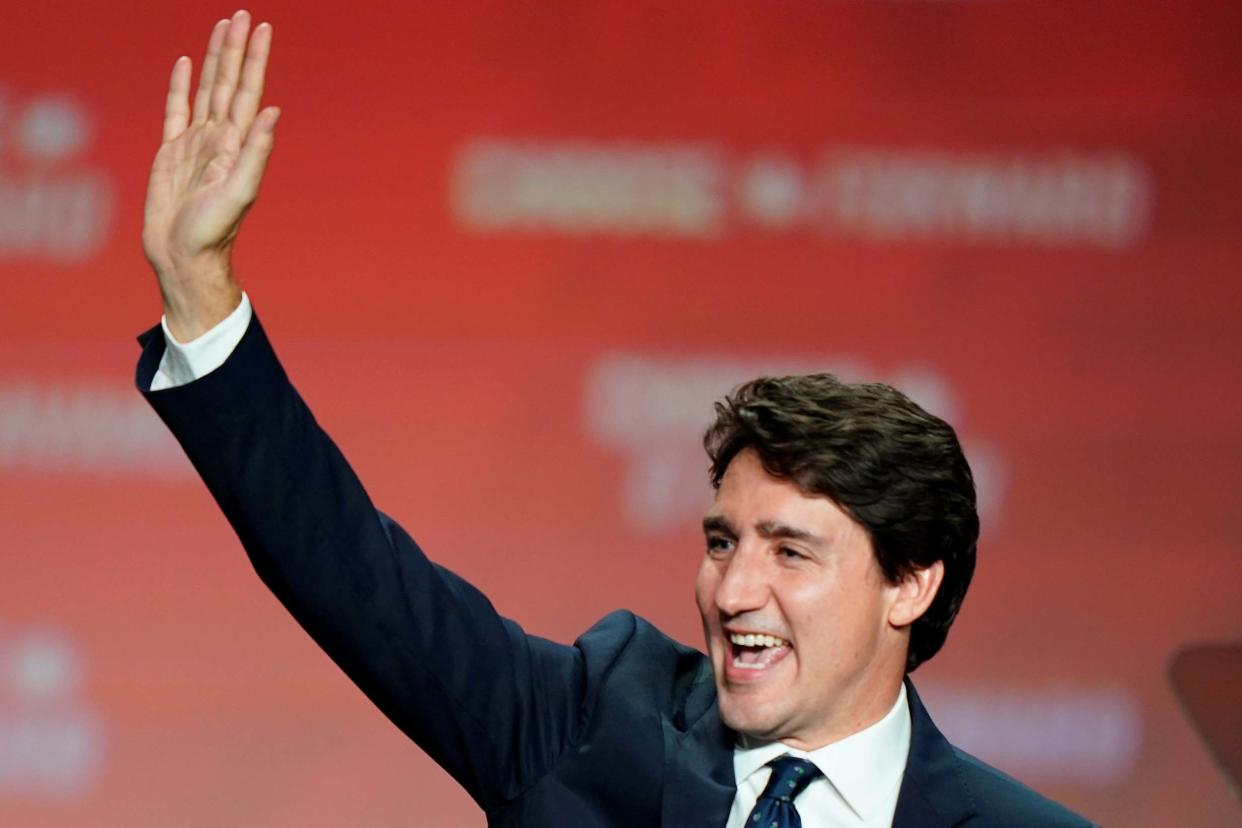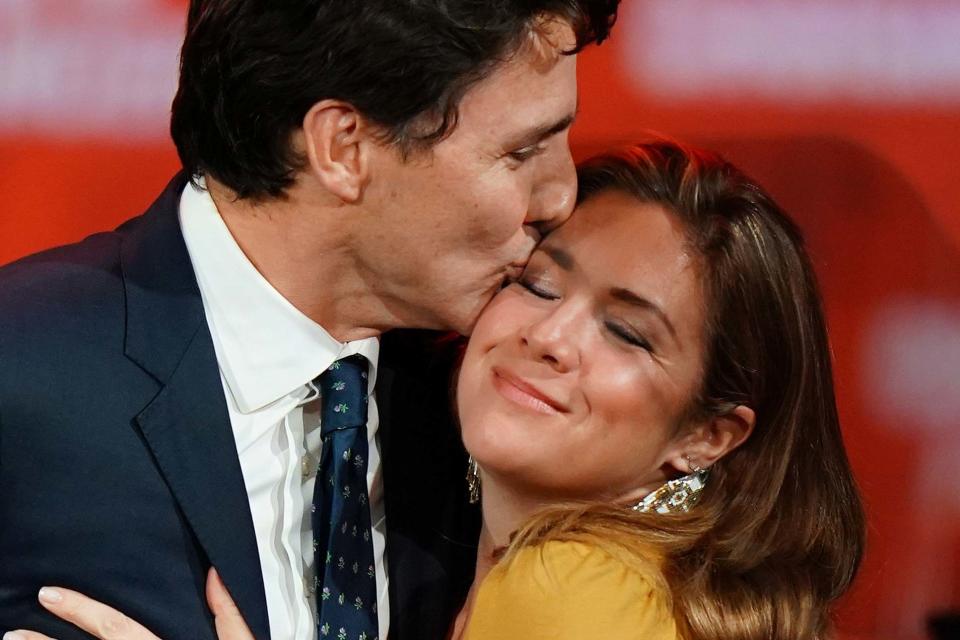Justin Trudeau 'has a lot to prove' after scandal-hit campaign sees him lose majority

Canada’s voters chose to humble their Prime Minister, Justin Trudeau, rather than boot him from office on Monday.
While he won a second term as Prime Minister, he must now govern with a minority in parliament, grubbing for votes from rival parties in order to pass legislation.
Trudeau’s Liberal party won 157 seats, short of the 170 needed for a majority, and well down from the 184 they won in 2015. His rival Conservatives edged the popular vote, with 34 per cent to the Liberals’ 33 per cent.
A year ago, such a result seemed unimaginable. On taking office, Trudeau said his government would be open, transparent and committed to “sunny ways”. “Canada is back,” he promised and, in many ways over his first three years, he delivered.

He was a thoroughly modern campaigner, facile with social media, generous with selfies, and effortlessly attuned to liberal, progressive culture and ideas.
While rivals thought of removing their jackets as an act of staggering informality, Trudeau was busy doing strength-defying yoga poses and jogging without his shirt on.
As Prime Minister, he rushed through the legalisation of recreational marijuana and assisted suicide. He talked about the challenge of climate change, welcomed 25,000 Syrian refugees to Canada, participated in a Pride parade and promised a feminist foreign policy.
When he was asked why he had decided to appoint equal numbers of men and women to his first cabinet, he replied tartly, “because it’s 2015”. He even managed a complex negotiation with Donald Trump, to pull off a revamped trading agreement with the United States and Mexico.

His opponents, however, accused him of being all style over substance. While he gathered followers on Instagram, Canada’s fiscal deficit rose. Energy producers in the west of the country suffered as oil and petrol prices fell, and the government seemed more interested in imposing a carbon tax to cut greenhouse emissions than to help a huge sector of the economy.
Taxes have remained high and investors have been pulling out of Canada under Trudeau in favour of other countries, notably a booming United States.
He was also criticised by his fellow progressives when his government acquired a pipeline to transport oil from Alberta to the Pacific coast. Environmentalists said it would lead to more drilling. Canada’s indigenous nations said it would degrade their land. Trudeau, they said, had sold out to the energy industry.
And this was before the scandals which sent his popularity plummeting.
First, he was accused of the kind of backroom political chicanery he was supposed to loathe. When SNC-Lavalin, a major engineering company from Trudeau’s fiefdom, Quebec, was accused of bribing the family of the late Libyan dictator Muammar Gaddafi to win contracts, Trudeau’s associates pushed the then attorney general to drop a criminal case against the firm in favour of a less punitive civil procedure.
The attorney general, Jody Wilson-Raybould, said Trudeau’s team threatened her and eventually demoted her because she refused to cooperate. The scandal led to Trudeau losing two women from his cabinet and charges of institutionalised corruption. He was personally found to have violated federal conflict of interest rules by intervening in the case.
Second, at the start of this year’s election campaign, photographs emerged of a twentysomething Trudeau dressed as Aladdin and wearing blackface to a fancy-dress party. When asked how many times he had worn blackface to parties, he could not remember. He did, though, concede that growing up in enormous privilege, as the son of the former prime minister Pierre Trudeau had left him with a “massive blind spot” on issues of cultural sensitivity.
The episode compounded suspicions that Trudeau is less a showman than a hypocrite. “It was a dumb thing to do,” Trudeau told reporters. “I’m disappointed in myself. I’m pissed off at myself for having done it.”
Trudeau has been in the public eye in Canada since he was born, while his father was prime minister. When he was just a few months old, US President Richard Nixon toasted him at a state dinner as a “future Prime Minister of Canada”.
But it was not until his late thirties that Trudeau entered politics, after spending his twenties working as a bouncer, a snowboard instructor and a teacher at a private boarding school. He was a quick student and rose swiftly through the Liberal Party ranks. He assumed the leadership of the party in 2012, after they had been drubbed in national elections.
In just three years, he transformed their fortunes, attracted scores of new parliamentary candidates, and led them back to power. He and his cabinet arrived at his swearing-in on a bus, rather than in the usual fleet of black limousines.
Trudeau and his wife, Sophie Grégoire, and their three young children, Xavier James, Ella-Grace Margaret and Hadrien, presented an image of a young, invigorated and thoroughly modern Canada. Besides the usual political coverage, they were fawningly profiled in Vogue and Rolling Stone.
But Trudeau has often walked the line between popularity and self-parody. He crossed it on a trip to India in February 2018, when he and his family dressed in a series of ever more exuberant Indian outfits. While Trudeau explained it as a display of respect to his hosts, many Canadians found his costumed preening excruciating.
During the campaign he arrived in a canoe to an event to launch a new federal programme to send children on camping trips. His endless displays of physical prowess have become a cudgel for his critics.
Many of the political challenges in Canada are common to other Western countries: widening economic inequality; growing support for Right-wing nationalists; and the rising cost of living for the middle class. Trudeau’s support is concentrated in Canada’s urban areas. The Liberals won no seats in the vast, agricultural and resource-rich territories of Alberta and Saskatchewan, where the Conservatives dominate. Voters in these places feel that Trudeau and Canada’s federal government have abandoned them in favour of cities including Toronto, Montreal and Vancouver.
Trudeau’s main campaign issue this year was affordability for parents, retirees and recent graduates. The cost of housing in Canada’s biggest cities has risen quickly, while incomes have not. Unemployment may be at historic lows, but wages have stagnated.
Both Liberals and Conservatives promised tax cuts during the campaign, but only Conservatives promised spending cuts to fund them. Under Trudeau, Canada’s deficit has grown and is expected to continue to expand for years to come.
Despite their arguments during the US-Canada trade negotiations, President Donald Trump tweeted after Trudeau’s latest win: “Congratulations to @JustinTrudeau on a wonderful and hard fought victory. Canada is well served. I look forward to working with you toward the betterment of both of our countries!”
Boris Johnson tweeted that the UK and Canada shared “history and values” and he looked forward to “continuing to work with you on priorities such as girls’ education and climate change.”
A more significant foreign intervention came a week before the vote, when former President Barack Obama, a hugely popular figure in Canada, weighed in with his support: “I was proud to work with Justin Trudeau as President. He’s a hard-working, effective leader who takes on big issues like climate change. The world needs his progressive leadership now, and I hope our neighbours to the north support him for another term.”
It is a political lifetime, though, since the Obama era and Trudeau’s first national election win. Their moment of shared progressive leadership has passed. Trump’s is now the loudest, most disruptive voice in world politics.
For all those who thought Trudeau might be the real-life version of Hugh Grant’s prime minister in Love Actually, standing up against a hectoring American president, he has been a disappointment. The SNC-Lavalin scandal left many thinking he is no more than a charming front man to the usual posse of political hacks.
But within hours of his victory speech on Monday night, Trudeau was waiting to meet commuters at an underground station in his Montreal constituency. They flocked around him with congratulations and requests for selfies. He has another term now to fix his legacy and was wasting no time.
Read more
Trudeau to form minority government after narrow Canada election win

 Yahoo News
Yahoo News 
